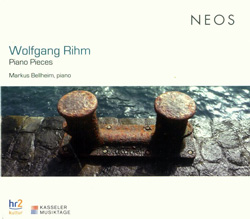
For those unfamiliar with Rihm's work, this 2-disc set provides a fine outline, a survey of his music for piano (performed by Markus Bellheim), thirteen compositions laid out chronologically from 1971 to 2007. It draws a portrait of a composer making his way out of the thickets of post-serialism, through a Feldman-like patch and ultimately coming to terms with his classical forebears, not in slavish imitation but in modernist emulation.
As information-packed as much of the music is, a dark, contemplative air is heard from the very first note of "Klavierstück Nr. 1 op. 8a" (1970), which retains its brooding nature throughout despite the increasingly spiky cascade of notes. One already hears a surprising affinity to earlier modes, a just-below-the-surface romanticism tinting music that otherwise veers from Boulezian complexity to the kind of limpid purity found in Feldman's work of the early 60s. Through "Klavierstück Nr. 6 >Bagatellen<" (1977/78) (assuming there's a Nr. 3, it's omitted here), the works become gradually more somber, Rihm more often allowing the notes to linger in their duskiness when they're not hyper-compressed into astonishingly dense matrices. There's Feldman, yes, but one also senses an awareness of recently political composers like Rzewski and Wolff in the growing appreciation of certain previously forbidden tonalities as well as, it must be said, a tinge of pomposity ("Klavierstück nr. 5 >Tombeau<", first movement). Still, "Ländler" (1979), which closes the first disc, comes as something of a surprise and a fetching one. A dreamy, elegiac melody slowly unfurls, like something out of Satie's Rosicrucian period, though it's dedicated to Schubert and one can understand that given its subtle dance-like and folk references. It's somewhat halting, as though Rihm is being cautious about daring to venture into such overtly warm waters. A lovely piece, it fits into an odd niche at that time, one occupied by composers as disparate as William Bolcom and Cornelius Cardew.
The second disc, spanning works from 1980 to 2007, more or less continues this path into a combination of neo-romanticism and complexity, much of the latter occurring in the area of rhythm where Rihm sometimes, as in "Klavierstück nr. 7" merges an underlying sense of propulsion with a hesitant, staggering quality atop, like some large machine with bits of sand in its gears, as it lurches along, ending as a wayward, bumpy chorale of sorts. The brief "Brahmsliebewalzer" slides unapologetically into lushness, all soft tonalities yet retaining a contemporary, questioning edge throughout the hazy waltz. "Nachstudie" (1992/94) is a 26-minute, sparsely populated sound field with strident, loud, staccato chords strewn among softer, quiet, tonal ones; it almost diffuses entirely, barely held together by the drifting clusters. This is followed by a five-part memorial suite, "Zwiesprache", appropriately somber, the pieces beautifully modeled, again in soft, attractive tonalities, sometimes recalling Messiaen. The collection closes with three lovely miniatures from the new century, the languorous "Auf einem anderen Baltt", the even more pliable "Zwei kleine Schwingungen" (with two short movements, "slow" and "calmo") and "Wortlos", each threatening to evanesce from the present world to some other plane.
The journey is fascinating and the picture limned of Rihm, idiosyncratic and impish, though also of a composer possessing serious levels of depth and layers of intent likely still awaiting peeling.
Comments and Feedback:



More Recent Reviews, Articles, and Interviews @ The Squid's Ear...


|

